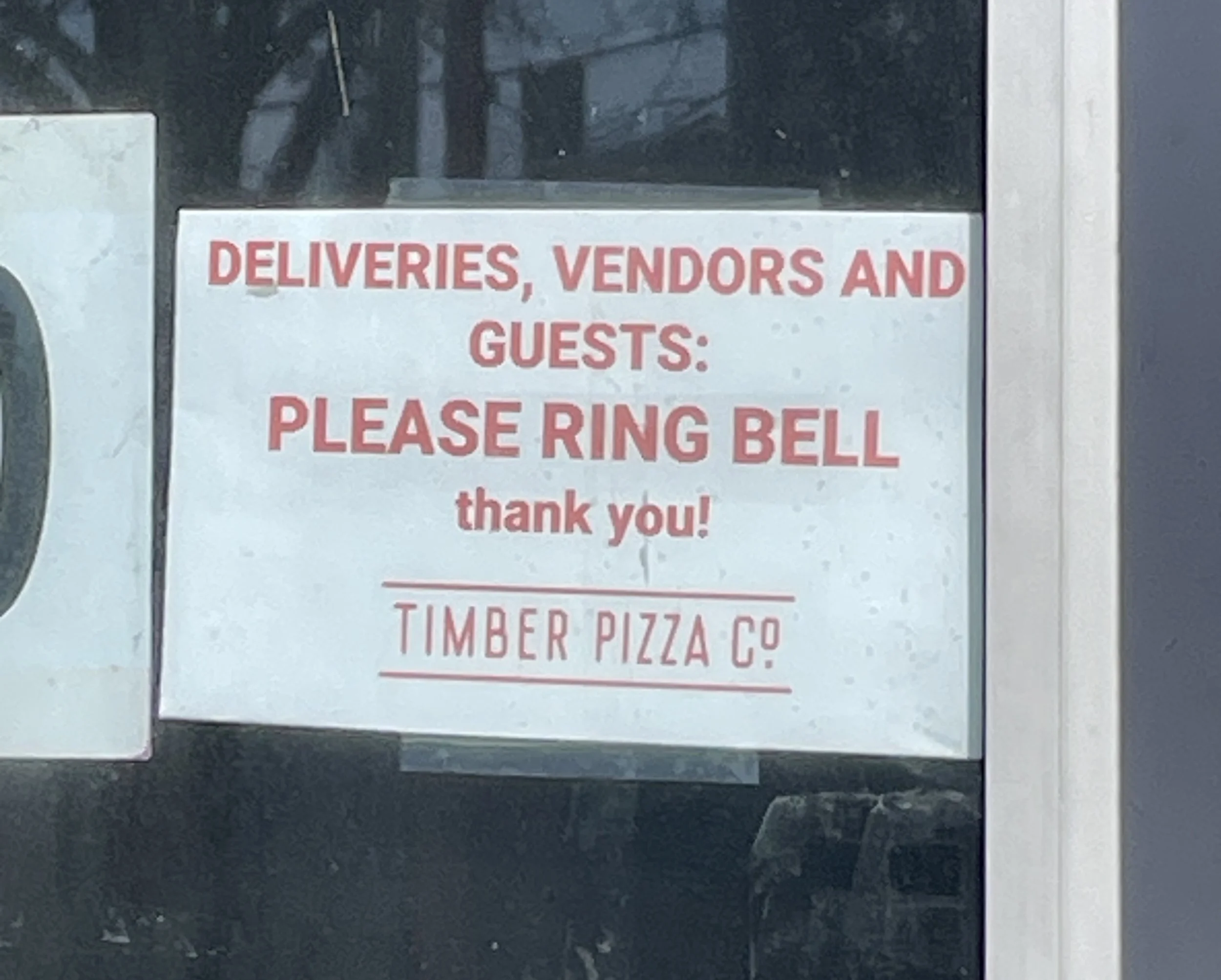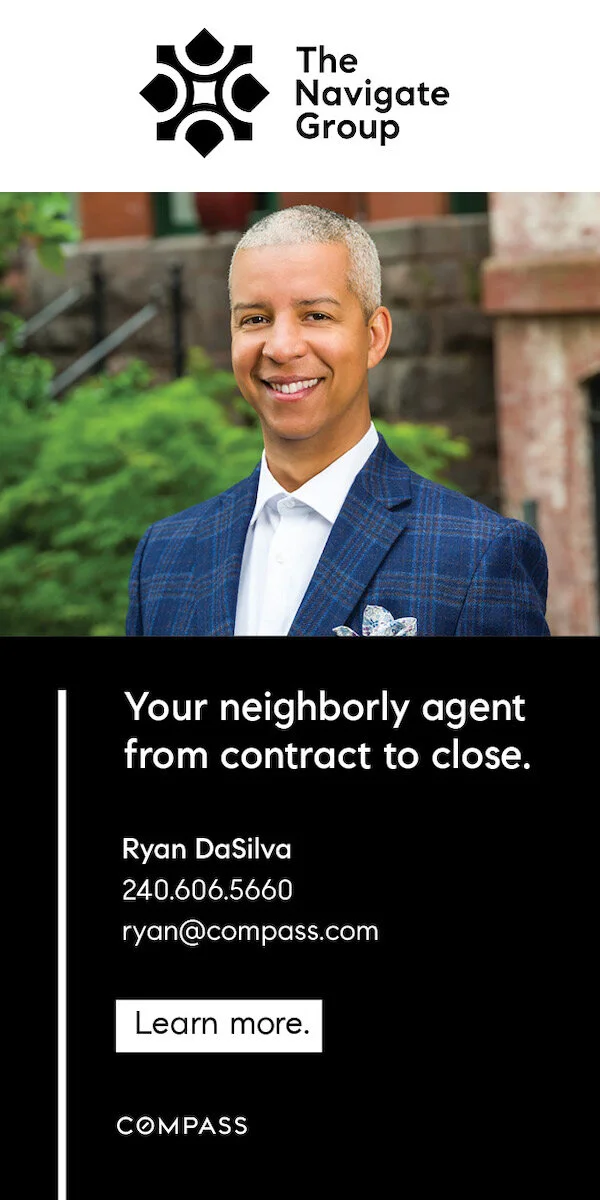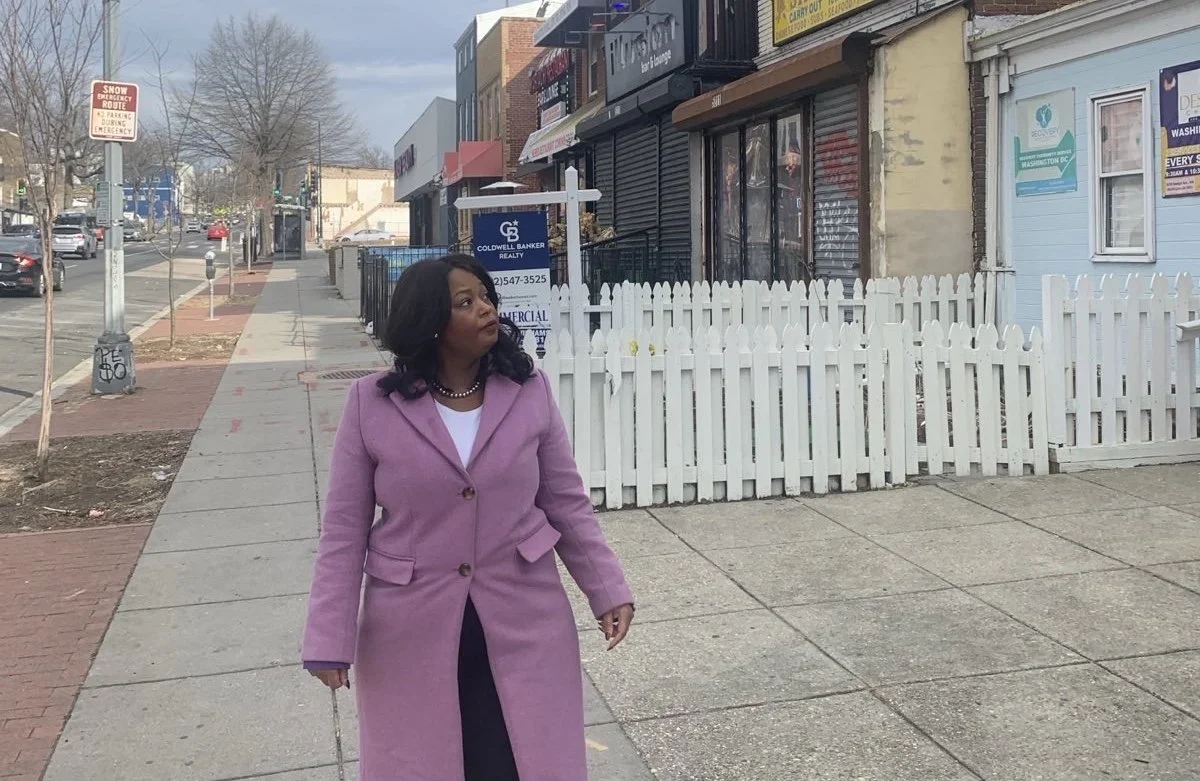A conversation with Leon T. Andrews, candidate for Ward 4 Council
/Leon T. Andrews is running for Ward 4 council for the second time in as many years. Last year he joined a very large group that ran in a special election to replace Muriel Bowser after she became Mayor. Brandon Todd, Muriel’s Constituent Services Director, won that election and has filled the seat for the remainder of her term. Now the seat is up again, Andrews, who came in third in last year’s race, has thrown his hat back in the ring.
We met at his campaign headquarters, a house on Kennedy Street, to talk about his background and his thoughts on the race. The entire house is dedicated to the campaign, from the myriad signs outside, to the charts, various important documents and a Ward map on the inside walls.
Leon and Kristine Andrews and their three daughters
There’s also a poster of Martin Luther King, Jr., drawings by Leon’s children, an Obama campaign “Hope” poster from 2008 and other inspirational signs. The Kennedy house used to belong to his aunt, Myrtle Jonas, and has been in his family for a long time. Now the entire house is being used to support the campaign, but it's clear that this was someone's home. But like the Andrews' own life at the moment, everything has shifted to supporting the campaign.
Leon has three young daughters with his wife Kristine, who has a PhD in marriage and family therapy. They live right around the corner in the same house he grew up in, and have kept the house much like it was when he was growing up.
Read Leon Andrew's campaign positions on several key topics >
Drew/Petworth News: This is your second time running for Council, so let’s start by talking about why you’re running.
Andrews: Yes, as you know I ran last year, there were 13 of us who ran, essentially I came in third among 13. I was new to DC politics, and to come in third and come in among other seasoned DC politicians says something good about what we did last time. A number of those that are not in the race now have now officially endorsed me as the strongest candidate — seven of last year’s candidates have officially endorsed me. Which is, if you know anything about Ward 4, is a very rare thing to happen.
I think it speaks to who I am, my leadership, ability to be able to bring folks together and unite the Ward, which is how we’ve been talking about it. So I put my hat back in the race and wanted to make sure we worked as hard as we can to send a message that we’re about uniting the Ward, and I do think we need effective, competent leadership on city council again. I feel it’s time for me to do at home what I’ve been doing in cities across the country, making them more responsive to hard-working men and women and expanding opportunities for residents.
What makes you feel that Brandon Todd, a year plus into his term, is not effective and competent leadership for the Ward?
Well, I think now he has a record to speak to, and so the question is “What have you done on behalf of Ward 4 as a city councilmember?” As we talk about the priorities our Ward faces, as we talk about crime and education, and we talk about development and housing, for me I haven’t seen anything in his record. I’m happy to have that exchange, that conversation with him, as we talk on behalf of the Ward. I haven’t seen anything he’s been leading on from a councilmember’s perspective to take on these tough issues. It’s important to do walk-through and it’s important to host meetings, but as a councilmember you also have to know how to take action, how to legislate, you have to know how to look at budgets.
My experience serving on national boards, overseeing $20 million budgets, working on these other boards — where you think about DC, it’s a $14 billion corporation — so how do you know how to lead in a space where you’re looking at how resources have to be used appropriately on behalf of our residents?
What I haven’t seen in his record, hosting an event and a neighborhood walk-through, doesn’t speak to city council leadership. What’s different between now and last year, is he’s had 12 months and a record to speak to?
There’s been questions on support and fundraising in the Mayoral and council races across the city. Do you see campaign fundraising from developers as a problem, or part of the natural process to support businesses in the Ward?
I think the larger issue is a general sense of “pay-to-play.” When I decided to put my hat back in the race again there were strong examples of those concerns, a general sense of backroom dealings going on. So the first issue I came out and spoke against was the Pepco-Exelon merger, and I think that spoke clearly to not having the pulse and tone of where we were as residents in our Ward and the concerns we were having about the deals and the commitment to reliable energy from renewable sources, looking at concerns about the rates and who’s getting what in these deals.
Our leadership on council seems to be in lockstep with our current mayor — and again, I’m in support of the Mayor, happy and honored to serve on the DC commission on African American affairs, which I was recently appointed to. So it’s not about being supportive of the mayor, but it’s definitely much more about being an independent leader, how you are representing and being beholden to the people you’re serving.
The conversation we’re having right now about the temporary housing facility [at 5501 5th Street] and how the process is playing out with developers, the stories we’re hearing about contributions that were made to [Todd’s] campaign by the developer for the current house on 5th and Kennedy, and made a contribution earlier last year and how he approved the deal for the developer. There was no other deal being considered in the Ward, which is crazy to me that we didn’t even look at another option? It has this feeling of what’s happening behind the scenes and who’s representing us in the space. That’s the larger conversation.
What are your thoughts on the new temporary housing facility coming to 5th and Kennedy?
The larger conversation of “Do we want to shutdown DC General?” Yes. Should we all share the responsibility of thinking about how we support the homeless population across our Ward? Yes. I don’t think those two are really the issues we’re really dealing with. I do think that is how it is being presented as we talk about the problems, and as we’re talking about the process there are concerns about why was this site selected, and why weren’t other sites considered? What are the plans as we’ve made the decision for it to be located here on 5th and Kennedy Street to take on the commitment to the larger investment and development on Kennedy Street. I don’t know how many times I’ve heard politicians say they’re going to revitalize Kennedy Street and for years all we’ve seen are empty promises. I grew up here, right up the street. Still looks the same, if not worse, as I think about resources that used to be here on the block.
The language [of the proposal] sounds find, I have a lot of respect for Brenda Donald, the deputy mayor, and they understand the issues of wrap-around services and the right kind of units that need to be in place. They’re going through the presentation fine, but I don’t think they understand where we are right now as a community as we’re not looking yet to talk about the design and the color of the flowers. We’re missing a step in the process. I think that’s the space, not really understanding the pulse, leadership on our council to really understand that and lead in that way. We’re not even engaged in a process [to make adjustments based on community concerns], one that would be allow for a healthy exchange and process for the community. I’m looking for a commitment to plans on development on Kennedy Street, not just talking about it.
The Andrews campaign headquarters on Kennedy Street... a house once owned by Leon's aunt.
Let’s talk about development on Kennedy Street and in the Ward itself. KSDA has done a lot of work to force the city to deal with vacant properties and tax issues on Kennedy. A lot of people care about revitalizing Kennedy Street but don’t know what to do about it. When you look at the development in Petworth, you see a wave of redevelopment and changes like increased safety. However, there’s concerns about gentrification and what it means to the neighborhood, about pushing people out of the neighborhood or out of the opportunity to enjoy the benefits of the changes. When we talk about the redevelopment of Kennedy Street and others like it, how do you think we are able to improve for everybody in a balanced way?
You’re asking an important question, a huge question. For effective development along Kennedy Street, upper 14th Street, Georgia Avenue business corridors, and so on, is the need for Main Street designations — we don’t have any in Ward 4, which is incredible to me. It means we can’t tap into the kind of resources to do the kind of developments that we need. It’s mind-boggling to me that we wouldn’t have any, considering the type of representation we have on council, where council members live. We have our Mayor who lives here in our Ward, the chair of our council lives here, our councilmember lives here and we don’t get consideration for Main Street designation? Where’s the leadership here? Clearly neglected business corridors while we’re seeing other parts of the city develop.
As we talk about gentrification, I don’t see the word as a bad word. People typically use it as a way of speaking to something bad. Gentrification is not a bad thing, more diversity in your city, that’s not a bad thing. Creating a higher tax base in your city is not a bad thing, you want that — if you don’t, you’re not thinking about the sustainability of your city. Every city is striving to create more a diverse tax base. So I don’t think we want to associate the term as bad, but I do think we have to be concerned about the issues connected when you are creating a more diverse community, and I think it goes back to where your values are as a city and as leadership. There are concerns as we talk about creating more diverse community of how it impacts affordable housing.
Developers are asked to only create affordable housing for 80% of AMI or below, and that’s about $80,000. You need to be committed to the 0-30% of AMI, as well as the 30-60, and you have to understand that there’s value in that level of diversity, too, as we’re committing to the growth. I don’t get a sense that there’s that level of commitment to making sure we represent those populations in our community that are in the 0-30, 30-60, and it almost feels at times that we’d be fine if we look up and they no longer exist, and I don’t think that’s healthy for a community. There’s a need to make sure we’re advocating.
There’s racial and ethnic inequities connected to that, there’s senior inequities connected to that, the people who live here who can’t age here because the value of their property continues to go up. There’s a range of conversations that we need to have.
We spoke at length about policing and wrap-around services at non-judicial ways to manage crime (such as the op-ed by Nicole Porter recently published on Petworth News). Leon told me a story about a young man he mentored when he was in high school and college, and now the man is 29, two kids and has a stable life. Leon said he knows from experience the how large the benefit is of interaction and support for those who need it.
Nicole was right on point about the comprehensive level of investment we need to be making, it’s prevention, intervention and enforcement. You don’t want the police to be involved, as they’re the last step. What are the ways we can focus on the individual level, getting them what they need, up to the level of a community getting the opportunities?
There’s not one answer, nor should we be framing it in the context of who we should be blaming. I hear the perspective that when it gets to the police, a lot of other failures that have happened along the way. Those failures could be at the individual level, institutional and systemic level, generational… it’s complicated.
The question is do we share responsibility for how we respond? I think the sharing of responsibility is the space I operate in as we try to come together on behalf of our city and our community to make it the place we feel it deserves to be, the special place we all call home.
It needs a reframing, a level of shared responsibility we own together as we work on how we respond. It’s thinking about different levels of partnerships, with the faith community, other agencies that we can engage. It’s holding the [MPD] chief and police officers responsible, holding parks and recreation responsible, department of employment services responsible, education systems and how they step up to the table. And even how we think about our educational systems, and the need to be invested in not just these traditional settings, but also trade schools, pathways that create opportunities for young people to get a trade. It’s about really giving them a pathway to really be productive citizens, sending a message that we value you in our city. For me, it’s not separate silent conversations.
It’s not rocket science, I’ve been working on youth issues for 25 years. As a person who sought mentors in my life, and knowing what it means to be a mentor in other people’s lives. I’m not in and out, I’m there. It’s helping them feel physically, emotionally and psychologically safe. It’s about our level of investment in it, from education to after-school, prevention and intervention programs, valuing our young people in the way we say do, is reflected in the types of budgets we put it. It comes back to our values, and who we want to be. If we don’t have the hard conversations, then we’re going to find ourselves finding solutions that don’t involve them, that doesn’t actually help them, just moves them someplace else.
The candidate at his desk at his campaign headquarters.
The DC Councilmember role is a busy position. Are you working full-time now?
I took a leave of absence, but I work at the National League of Cities, been there for a decade now. I advise mayors on strategies, policies and evidence-based programs. I’m director for a new effort on race equity and leadership that looks at the impact of implicit and explicit bias, and how it shows up in policies. I came in initially as a program director for youth development, how we authentically engage youth with local government.
If elected, do you stay in that role, or do you leave and work full-time as a councilmember?
At a minimum, I’d love to figure out to stay connected to the resources available at the National League of Cities. By no way do I think I can I stay in my current role and be city councilmember. I would want to tap into those resources though, that would help me be a more effective councilmember.
Read Leon Andrew's campaign positions on several key topics >
I appreciate the time that Leon Andrews spent speaking with me and answering questions. Be sure to check out the full responses to the prepared questions Petworth News submitted to the campaign. If you have questions for the candidate, feel free to post them below or contact the campaign directly. As a reminder, Petworth News is not endorsing a candidate, only offering interviews and overviews of their campaign positions.



















